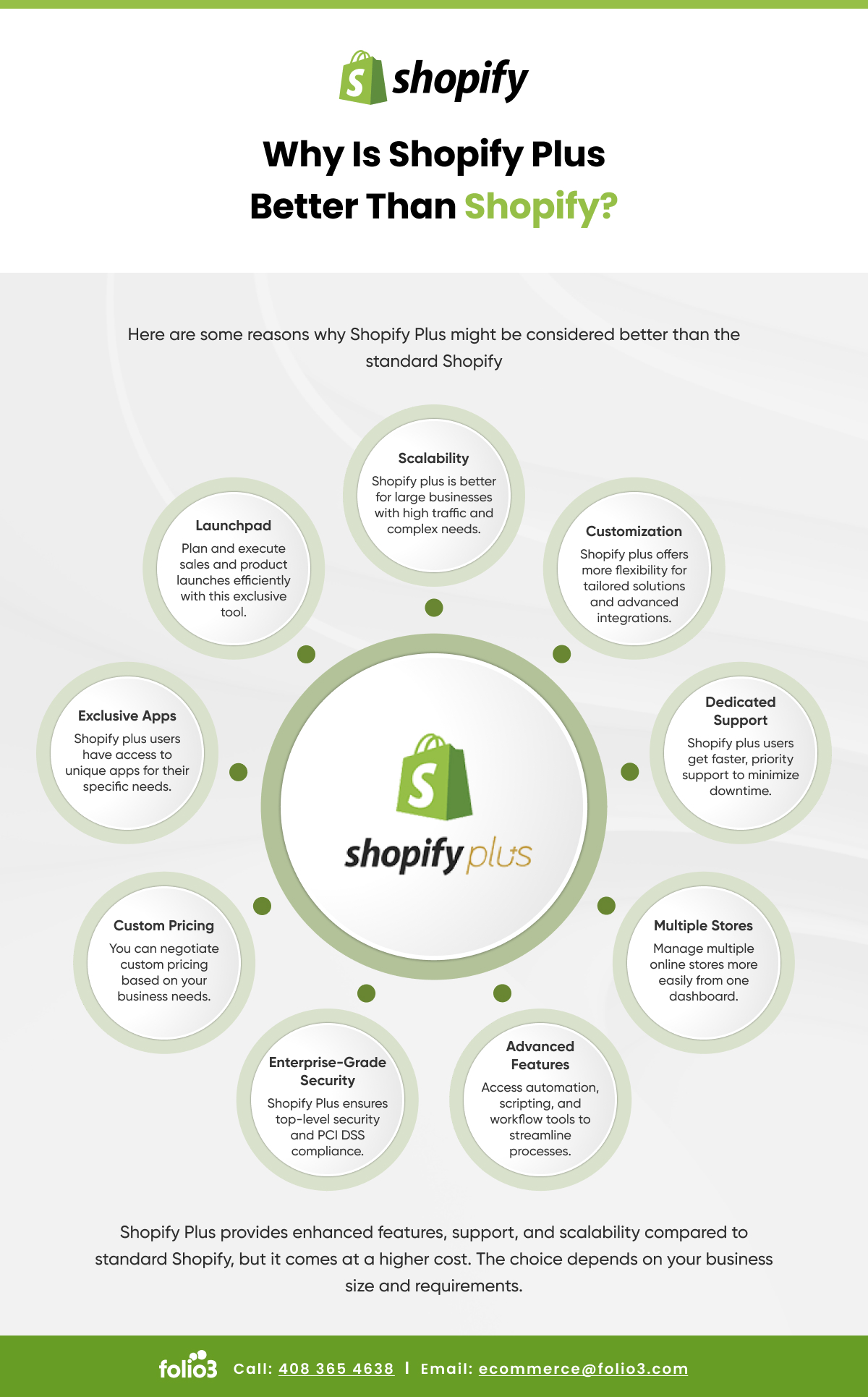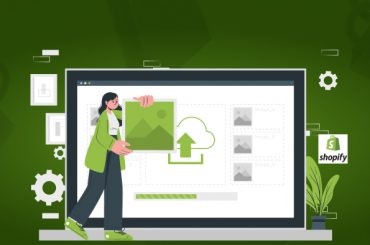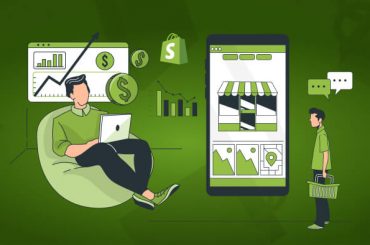Shopify Versus Shopify Plus: What Is The Difference Between Shopify And Shopify Plus?
Last Updated | January 18, 2024
Table of Contents
What Is Shopify Versus Shopify Plus?
When it comes to choosing a commerce platform for your business, you might get confused between some big names like Shopify and Woocmmerce. However, when it comes to Shopify vs. Shopify plus, the situation often gets out of hand, and one is unable to decide which one is the best. Worry not; we are here to help. This blog will help you make a well-informed decision and pick the one that suits your requirements.
Shopify is a commerce platform that allows you to build, grow, and develop your business. The platform is entirely cloud-based and also hosted, reducing the need for managing web servers of your own.
On the other hand, Shopify Plus is known to be an upgraded version of our favorite Shopify. Both of these platforms feature quite similar user interfaces. However, if we talk about advancement, Shopify Plus’ features are better than those we get with Shopify. We’ll discuss that in detail later. Also, pricing plans have a noticeable difference.
Simply to say, Shopify is used for small businesses, whereas Shopify Plus the best for large-scale businesses with high volume sales. To be precise, the sales revenue of the businesses that are based on Shopify Plus is at least $1 million.
Why Need To Compare Shopify and Shopify Plus?
Shopify e-commerce solutions are beneficial for both shoppers and sellers. The technology that the platforms use offers flexibility and ease of use to grow your business. Businesses can maintain and cultivate the online shopping experiences of buyers and create a brand identity to generate good revenues. On the other hand, buyers enjoy access to digital marketplaces that features better navigation, prominent visual designs, and simpler checkout options.
Shopify vs. Shopify Plus is an equation that’s not easy to evaluate. However, there are some basic attributes that both of these platforms share. If you are a company desperate to look into options that both commerce platforms have to offer, keep on reading to have a better understanding.
Why is Shopify Plus better than Shopify
Shopify Vs. Shopify Plus – Shopify Web Design and Themes
Both Shopify and Shopify Plus features about sixty themes to choose from. When it comes to creating your e-commerce store, you want to choose a theme that best reflects your brand and values. Considering the fact that both platforms have a good range of themes, you won’t have a problem choosing the one that suits your preferences. You will find 59 paid themes and 10 free themes. The paid ones have varying costs varying anywhere from $140 to $180.
You might think it is so much, but you will be relieved to hear that it is a one-time investment to make your website look attractive.
The best part is that themes are available in several languages. So if you are targeting a specific audience in any country, it will be a lot easier for you. These languages include Italian, English, German, French, Spanish, Brazilian, Japanese, etc.
You can do the basic customization using Shopify’s editor. Also, once you are done adding products, it is up to you to decide where you want o display them in your store and if you want to categorize them into pages.
As far as the deeper control level is concerned, you must have some knowledge of coding, or you can hire a developer. Liquid is Shopify’s theme language. You can write codes in Liquid in order to alter your theme according to your preference.
On the contrary, Shopify Plus is used for businesses of enterprise level. So if you belong to that category, you might already own a website.
Shopify Plus offers you a launch manager as they take the responsibility of ensuring your website’s integration into Shopify. You won’t have to worry bout writing codes. Also, they will provide a Shopify custom theme to get you up and to run.
Another major difference between Shopify and Shopify Plus is the option you get to edit the checkout page. Shopify does not enable its users to customize this page; however, with Shopify Plus, you can customize the page accordingly.
Shopify Vs. Shopify Plus – Budget and Pricing
Shopify offers three pricing plans.
- Basic Shopify at $29 per month.
- Shopify at $79 per month,
- Advanced Shopify at $299 per month.
These three pricing plans of Shopify allows users to access various essential features like abandoned cart, multi-channel integration. However, there are some minor differences. If you like crating and seeling discount or gift cards, the basic plan is not what you should choose. You will have to choose between Shopify and Advanced Shopify.
Advanced Shopify offers you additional useful insight. You are eligible to receive professional reports and shipping rates calculated by a third party. Also, if you wish to speed up your scaling process, these two features help a lot.
The good news is that you will get to have a fourteen-day free trial to use Shopify and see if this is what you have been looking for. You do not have to make any investment before the trial period ends.
On the other hand, to get a Shopify Plus pricing plan, you will have to contact Shopify Plus directly, and they will send you a quote. They do not make their pricing plans visible. After you the plan, you can further discuss stuff like monthly turnover, business model, marketing requirements, and negotiate on the pricing.
Shopify Vs. Shopify Plus – Transaction Fees
When it comes to transaction fees, there is not much of a difference between Shopify and Shopify Plus.
With Shopify, the transaction fee is fixed. Whereas with Shopify Plus, you can negotiate on the fee you have to pay per transaction. However, we can help you get a general idea that you will have to pay something around 1.6 percent plus 30 cents per transaction.
Moreover, 3D secure is one essential feature that both of these platforms offer. It protects merchants from potential fraud during credit card transactions. So if you end up processing a deceitful payment, you won’t be liable for it!
Shopify Vs. Shopify Plus – Support
We can give you q quick heads up here. Shopify Plus has better Support than Shopify.
Support is what you must look for when choosing a platform for your eCommerce store development. If you are an enterprise-level business, you should go for the platform that offers you better Shopify support, i.e., Shopify Plus.
Simply to say, Shopify Plus provides you account managers who are responsible for managing your account. These managers will include merchant success managers, launch managers, and 24/7 support managers.
When you are ready to start, launch managers will help you set up your store and offer required technical assistance for Shopify store development or Shopify migration. Also, merchant success managers will help you move in the right direction to boost your profits. This involves sales channels, billing support, and so on.
Shopify Plus Vs. Shopify – Ecommerce Features
Sales Features of Shopify
These features are available on both Shopify and Shopify Plus.
Multi-Channel Integration
It may sound challenging, but in reality, it is not that complicated. Multi-channel integration enables you to sell on various platforms. Shopify allows you to sell your products on popular marketplaces like eBay, Amazon, Instagram, Facebook, etc.
Think about it. If a customer does not have to leave the platform where they can see your product, there is a huge possibility that they will end up buying it. This feature builds your customer base, and it can include even those who have never visited your website.
Abandoned Cart Recovery
Whenever a customer visits your online store, adds some items in their cart but leave without completing the purchase, abandoned cart recovery help you to get them back and complete their purchase. Shopify will generate an automated email on your brand’s behalf and send it to your customer who has abandoned their cart. Such emails can provoke customers to complete their purchase. Also, abandoned cart recovery is a built-in option, so you do not have to do a lot to get this option.
Multi-Currency Selling
If you use Shopify’s own payment processor, your store will adjust the currency automatically for all your products based on where your customers are located. This makes things a lot easier for your customers as well as for you.
The product prices will change as per current exchange rates. It is the best option to choose if you wish to sell internationally. Shopify supports the following currencies: SGD, JPY, NZD, HKD, AUD, CAD, USD, EUR, and GBP.
Sales Features of Shopify Plus
The following features are only available with Shopify Plus.
Shopify Flow
You need to make the best first impression. Shopify Flow allows tailoring that impression and that too individually. Once your customers have signed up, you are able to track their purchases. This way, you can customize your homepage according to their preferences. This is a fun way to keep your customers happy and grow faster.
Of course, a buyer who is interested in buying cosmetics will always look for the best current offers on cosmetics. So if you are giving them what they need, they are more likely to come back repeatedly.
Script Editor
Shopify Plus allows you to have better control over your operations. It also gives you the best control over shipping—creating scripts for line products and payment methods. The ability to customize all aspects of your store from minor details to the major ones is what you must be looking for.
It is just as if you are painting a huge landscape. You can use a bunch of brushes, but if you have the whole range of brushes, you can put as many details as you want.
Integration With Existing Platforms
There is no limit to the variety of Shopify apps that can be connected to your Shopify Plus store. This is how you can increase your chances of high growth. Using Shopify’s API is the best thing you can do. You can consider the platforms for:
- Product information management (PIM)
- Enterprise resource planning (ERP)
- Third-party logistics (3PL)
- Warehouse management software (WMS)
- Inventory and order management (IMS and OMS)
- Customer relationship management (CRM)
- Global fulfillment partner
Inventory Management
Shopify Plus offers amazing features for inventory management. This is the best option for merchants who are in their business’s early stages. Understanding inventory control and how your items move is a plus. Also, once you are ready to level up your Shopify inventory integration, you can always rely on tools like a stitch in order to access a variety of features, reports, and tools.
Order management and fulfillment
When your customers check out, Shopify does all the work in the background to deal with order management and fulfillment. The key is automation. This saves money and time and safeguards data recovery.
Is Shopify plus worth?
If you are an enterprise-level business, Shopify Pluss is surely a great option for you. It offers advanced features than Shopify.
What do you get with Shopify?
The range of features is the main difference between these two e-commerce solutions. Shopify Plus offers you better tools and advanced features. Also, you have complete control over your business, so it is easier to scale your business.
Who uses Shopify Plus?
Shopify Plus is for enterprise-level businesses that sell thousands of products daily.











